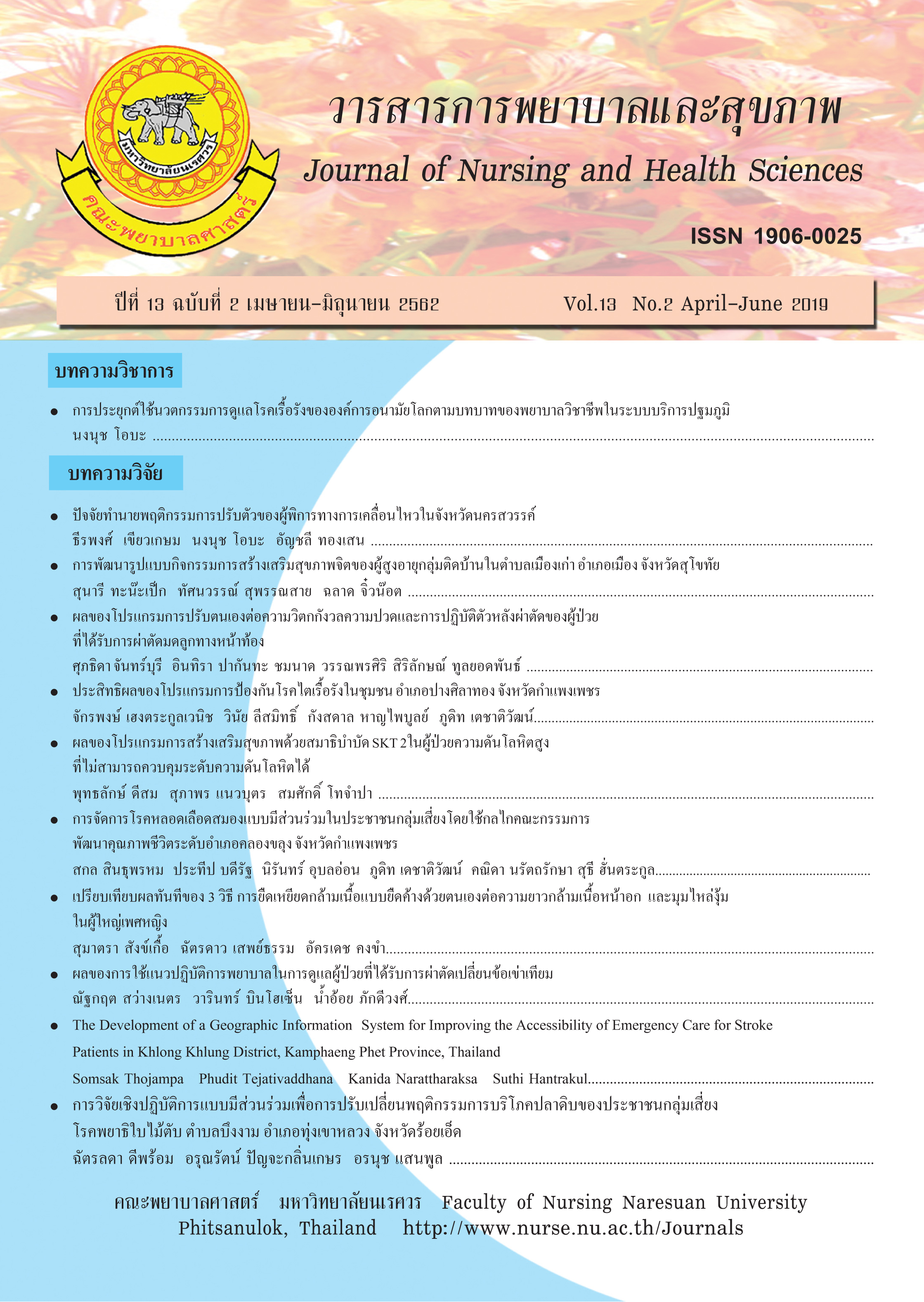ประสิทธิผลของโปรแกรมการป้องกันโรคไตเรื้อรังในชุมชน อำเภอปางศิลาทอง จังหวัดกำแพงเพชร
Main Article Content
บทคัดย่อ
การวิจัยกึ่งทดลองนี้ มีวัตถุประสงค์เพื่อศึกษาประสิทธิผลของการชะลอความเสื่อมของไตในผู้ป่วย โรคไตเรื้อรังในโรงพยาบาลส่งเสริมสุขภาพตำบลและในชุมชนจัดโดยทีมสหวิชาชีพและรับการสนับสนุน จากคณะกรรมการพัฒนาคุณภาพชีวิตระดับอำเภอประชากรศึกษา คือผู้ป่วยโรคไตเรื้อรังระยะที่ 3-4 จำนวน 936 คน ของอำเภอปางศิลาทอง จังหวัดกำแพงเพชร กลุ่มตัวอย่างคือ ผู้ป่วยโรคไตเรื้อรังระยะที่ 3 และ 4 ของ อำเภอปางศิลาทองจังหวัดกำแพงเพชร 77 คน แบ่งออกเป็น2 กลุ่ม ได้แก่กลุ่มทดลอง เป็นผู้ป่วยโรคไต เรื้อรังโรงพยาบาลส่งเสริมสุขภาพตำบลท่าขึ้น จำนวน 47 คน และกลุ่มควบคุม เป็นผู้ป่วยโรคไตเรื้อรัง โรงพยาบาลส่งเสริมสุขภาพตำบลหนองหล่ม จำนวน 30 คน ระยะเวลาวิจัย 6 เดือน ระหว่างเดือนพฤษภาคม ถึงตุลาคม 2561 กลุ่มทดลองได้รับบริการตามปกติและมีการอบรมและเยี่ยมบ้านโดยทีมสหวิชาชีพในขณะที่ กลุ่มควบคุมได้รับบริการตามปกติ เครื่องมือที่ใช้เก็บข้อมูลคือแบบสอบถามข้อมูลทั่วไปและข้อมูลด้านสุขภาพ แบบทดสอบความรู้ และแบบประเมินพฤติกรรม วิเคราะห์ข้อมูลด้วยสถิติ ร้อยละ ค่าเฉลี่ย ส่วนเบี่ยงเบนมาตรฐาน และ paired t-test ผลการศึกษา พบว่าหลังจบการวิจัยทั้งกลุ่มทดลองและกลุ่มควบคุม มีค่าเฉลี่ยซีรั่มคริอะตินินเฉลี่ยเพิ่มขึ้น และอัตรากรองไตลดลงอย่างไม่มีนัยทางสถิติ (p > .01) อย่างไรก็ตามกลุ่มทดลองมีช่วงการเปลี่ยนแปลงของระดับซีรั่มคริอะตินินเฉลี่ย และ อัตรากรองไตเฉลี่ยที่ลดลงน้อยกว่ากลุ่มควบคุม กลุ่มทดลองและกลุ่มควบคุม มีระดับความรู้เฉลี่ยเพิ่มขึ้นอย่างมีนัยสำคัญ (p < .01) ทั้งสองกลุ่ม กลุ่มทดลองมีพฤติกรรมป้องกันโรคไต เฉลี่ยดีขึ้นอย่างมีนัยสำคัญ (p < .01) แต่กลุ่มควบคุมพฤติกรรมการป้องกันโรคไตดีขึ้นอย่างไม่มีนัยสำคัญ (p > .01) จากการวิจัยชี้ให้เห็นว่า การอบรมและเยี่ยมบ้านในระยะสั้นยังไม่สามารถชะลอการเสื่อมไตได้อย่าง มีนัยสำคัญ แต่สามารถเพิ่มระดับความรู้และมีพฤติกรรมป้องกันโรคไตเรื้อรังให้ดีขึ้นได้
Article Details
เอกสารอ้างอิง
Bhumirajanagarindra Kidney Institute. (2017). Our
kidney, we must know,how to eat faraway from
the dialysis machine for chronic kidney disease
patients predialysis period (3rd ed.). Bangkok:
Bhumirajanagarindra Kidney Institube. [In Thai].
Dell,R.B., Holleran, S., &Ramakrishnan, R. (2002).
Sample size determination. Institute for Labor
atory Animal ResearchJournal, 43(4), 207-213.
Department of Disease Control. (2016). Operating manual
for operations to reduce chronic kidney disease
indiabetic mellitus and hypertension. Bangkok:
Department of Disease Control Ministry of Health.
[In Thai].
Donald M., Kahlon B.K., Beanlands H., Straus S.,
Ronksley P., Herrington G., Tong A., …
Hemmelgarn, B. R. (2018). Self-management
interventions for adults with chronic kidney
disease: a scoping review. British Medical
Journal Open, 8(3), 1-21.
Ingsathit, A., Thakkinstian, A., Chaiprasert, A.,
Sangthawan, P., Gojaseni, P., Kiattisunthorn,
K., …Thai-SEEK Grp. (2010). Prevalence and
risk factors of chronic kidney disease in the Thai
adult population: Thai SEEK study. Nephrology
Dialysis Transplantation, 25(5), 1567-1575. https:/
/doi.org/10.1093/ndt/gfp669
Jiamjariyaporn, T., Banchuin, C., Vipattawat, K.,
Kanchanakorn, S., Saetie, A., Teerapornlertratt,
T., …Sitprija, V. (2014). Effectiveness of integrated
care on delaying chronic kidney disease
progression in rural communities of Thailand
(ESCORT study): Rationale and design of the
study. BMC Nephrology,15(1), 2-7. https://doi.
org/10.1186/1471-2369-15-99
Kidney Disease Association of Thailand.(2016). Thailand
renal replacement therapy year2014.Bangkok:
Kidney Disease Association of Thailand. [In
Thai].
Kidney Disease Association of Thailand.(2013). How
do kidney not fail.Bangkok:Srimeung Printing.
[In Thai].
Lee, S.J., &Chung, C.W. (2014).Health behaviors and
risk factors associated with chronic kidney
disease in Korean patients with diabetes: The
fourth Korean National Health and nutritional
examination survey. Asian Nursing Research,8(1),
-14. https://doi.org/10.1016/j.anr.2013.11.001
Ministry of Health.(2018). Report according to the
ministry indicators 2561:KPI CKD 2.3 delay kidney
deterioration 2561.Retrivedfromhttp://dmhc.dmh.
go.th/ hdc/reports/page_kpi.php?flag_kpi_
level=1&flag_ kpi_year=2018. [In Thai].
National Health Security Office (2016).Fund management
guide:National Health Security2016 manage
patients statements chronic kidney disease.
Bangkok:National Health Security Office.
[In Thai].
Parker, R.M., Baker, D.W., Williams, M.V.,&Nurss,
J.R. (1995).The test of functional health literacy
in adults: a new instrument for measuring
patient’s literacy skills. Journal of Internal
Medicine,10(10), 537-541.
Phuengphasook,S., Wanitkun, N., Towsakulkao, T.,
&Utriyaprasit, K. (2017). Health literacy, health
education outcomes and social influence, and
their relationships with type-2 diabetes and/
or hypertension patients’ clinical outcomes.
Thai Journal of Nursing Council, 32(2), 111-125.
[In Thai].
Polit, D. F., & Beck, C. T. (2006). The content validity
index: Are you sure you know whats being
reported? critique and recommendations. Research
in Nursing and Health 29(5), 489-497
Qobadi, M.,Besharat,M.A.,Rostami, R., &Rahiminezhad,
A. (2015).Health literacy and medical adherence
inhemodialysispatients: The mediating role of
disease-specificknowledge. Thrita, 4(1), 1-6.
Shi, J., Mo, X., &Sun, Z. (2012).Content validity index in
scale development.Journal of Central South
University. Medical Sciences,37(2),152-155.
Washington,T., Zimmerman,S., & Browne, T. (2016).
Factors associated with chronic kidney disease
self-management.Social Work in Public Health,
(2), 58-69.
Yaghmale, F. (2003).Content validity and its estimation.
Journal of Medical Education,3(1), 25-27.


